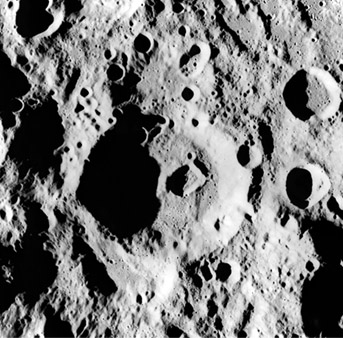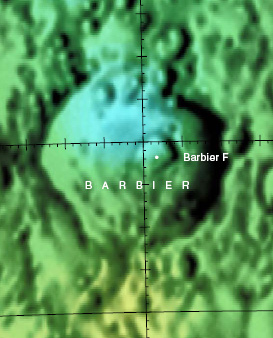Barbier
Contents
[hide]Barbier
|
Lat: 23.8°S, Long: 157.9°E, Diam: 66 km, Depth: km, Rükl: (farside), pre-Nectarian |


(Left) AS15-M-0287 from LPI, (right) Color-coded LAC 103 from USGS Digital Atlas.
Images
LPOD Photo Gallery Lunar Orbiter Images Apollo Images
- Large image of Barbier, large oblique view image of Barbier and Cyrano -- both resources available from the LPI Apollo Image Atlas.
- Barbier K, a curious elongated depression south-southeast of Barbier itself (between Barbier and Mare Ingenii) was captured by Lunar Orbiter II on Frame LO-II 075 h3 (near the lower left corner of the frame)(south up). Research: Danny Caes
Maps
Description
Barbier, like all the other craters that lie about this region, is an old-looking crater. To its north and north-west respectively lie Cyrano (89 km) and Gagarin (265 km), while to it's south, the rim and mountains of ejecta on which it formed on is the huge 2500 km-wide South Pole Aitken Basin (all pre-Nectarian in age -- 4.6 to 3.92 bn years). From the color-coded image above, the aqua-blue portion of the crater suggests a lower topography than the surrounding area. Is this due to Barbier impacting upon the affected southern rim of another, barely preceptible, crater half its diameter to the north, or, has it got to do with underneath collapse or faulting in the north-west region, as evidently seems to have occurred in the odd-looking, angular crater in the centre? - JohnMoore2
Description: Wikipedia
Additional Information
- A weird shaped crater in Barbier is mentioned in APOLLO OVER THE MOON: A VIEW FROM ORBIT, Chapter 7: Unusual Features (Part 2), Figure 238.
Nomenclature
- Named for Daniel Barbier (December 10, 1907 - April 1, 1965), a French astronomer. Between 1930 and 1965 he published nearly 100 scientific papers on astronomy. Among his works were studies of stellar atmospheres and lunar occultations and eclipses. He performed studies of the upper atmosphere, Aurora Borealis, the zodiacal light and the night airglow.
- Barbier was in the long list of farside names approved by the IAU in 1970 and published in Menzel, 1971.
LPOD Articles
Bibliography
Daniel Barbier in the Sourcebook Project (William R. Corliss)
- Page 366 in Mysterious Universe, a handbook of astronomical anomalies (1979) :
- Observations of the Zodiacal Light from a very high altitude station (D.E.Blackwell and M.F.Ingham, Monthly Notices of the Royal Astronomical Society, 1961).